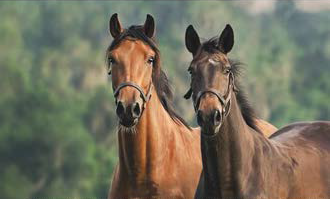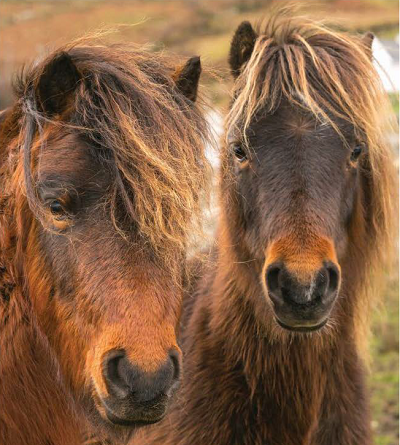Could You Spot PPID?
It's the most common hormonal disorder in horses and ponies


Written by Aimee Elyse Robinson
July 17, 2023
It's hard to imagine, but one disease impacts some 21% of horses over 15 years of age, yet goes nearly unnoticed.
Yes, Pituitary Pars Intermedia Dysfunction (PPID), also known as equine Cushing's disease, is that widespread, and that hard to diagnose.
Cushing's disease is the most common hormonal disorder affecting horses and ponies. This progressive neurodegenerative disorder in horses causes their pituitary gland to work overtime, leading to a range of symptoms that can affect a horse's quality of life.

Know the common signs
"One of the more prominent symptoms would be the shaggy hair coat-as they're unable to shed their coat out appropriately-[and] immune suppression, muscle wasting, weight loss, frequent urination and increased water intake," said Tony Hawkins, Technical Service Veterinarian at Valley Vet Supply. "It also predisposes them to laminitis and typically, there are some secondary issues with insulin and glucose regulation."
When considering Cushing's in horses, symptoms can range from mild to severe, thus signs often go unnoticed.
Be watchful for common symptoms such as:
■ Decreased athletic performance
■ Loss of muscle mass
■ Change in attitude or energy
■ Delayed shedding or no shedding at all
■ Excess fat on tail head or neck
■ Infertility
■ Abnormal sweating
■ Laminitis
■ Blindness
Horse Owner Casey Olson was a perplexed with the rapid change of body condition of their horse, Dodger, prior to his diagnosis. Olson said, "We noticed he wasn't holding his weight well. His coat had become long and curly, his mane was wavy and he was losing all of his topline. When spring came, the other horses were shedding, but Dodger didn't shed at all."
Dr. Hawkins explained, "PPID is a different illness and disease than equine metabolic syndrome, which usually has those cresty necks and weight gain; Cushing's itself typically causes weight loss. Historically, Cushing's disease and metabolic syndrome have been lumped together, but that is changing. They have different etiologies, and they really are two different diseases."
While the condition is most well- known for its incidence in seniors, horses as young as 5 years old have been diagnosed. Experts recommend that horse owners perform frequent health checks to identify early signs of PPID.
Managing Cushing's disease
While there is no cure for PPID, horse owners can alleviate the impact PPID has on their horse's well-being.
Available with a prescription from your veterinarian, the medication Prascend (Pergolide) addresses the cause of Cushing's disease, an overproduction of ACTH hormone.
"Prascend bies to regulate and decrease the production of ACTii," Dr. Hawkins noted. "It really helps to manage the clinical signs of PPID ... to help promote that quality of life."
With treatment, Olson's horse Dodger is no longer suffering from abnormal S\¥eating, weight loss, and a poor coat. He now sports a healthy
weight, shiny coat and his energy level is back to normal.
In addition to medication, through management techniques focusing on stress, health, and comfort, horse owners can help reduce the impact PPID has on their horse's life.
To reduce stress, implement a strict routine and avoid turnout with overly excitable, aggressive horses.
To help ensure the horse's overall health, continue to deworm regularly as needed, and vaccinate against emerging disease threats.
Because horses with PPID may have varying consistency of coat sheddingsome too much or others not at all their comfort can be increased by clipping their coat in the summertime and providing heavy, water-resistant blankets for cold weather in the wintertime.
Tags:Horse Sense

Acreage Life is part of the Catalyst Communications Network publication family.
















